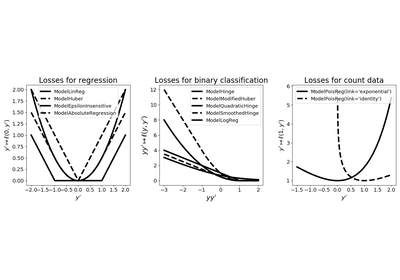tick.robust.ModelEpsilonInsensitive¶
-
class
tick.robust.ModelEpsilonInsensitive(fit_intercept: bool = True, threshold: float = 1, n_threads: int = 1)[source]¶ Epsilon-Insensitive loss for robust regression. This class gives first order information (gradient and loss) for this model and can be passed to any solver through the solver’s
set_modelmethod.Given training data \((x_i, y_i) \in \mathbb R^d \times \mathbb R\) for \(i=1, \ldots, n\), this model considers a goodness-of-fit
\[f(w, b) = \frac 1n \sum_{i=1}^n \ell(y_i, b + x_i^\top w),\]where \(w \in \mathbb R^d\) is a vector containing the model-weights, \(b \in \mathbb R\) is the intercept (used only whenever
fit_intercept=True) and \(\ell : \mathbb R^2 \rightarrow \mathbb R\) is the loss given by\[\begin{split}\ell(y, y') = \begin{cases} |y' - y| - \epsilon &\text{ if } |y' - y| > \epsilon \\ 0 &\text{ if } |y' - y| \leq \epsilon \end{cases}\end{split}\]for \(y, y' \in \mathbb R\), where \(\epsilon > 0\) can be tuned using the
thresholdargument. Data is passed to this model through thefit(X, y)method where X is the features matrix (dense or sparse) and y is the vector of labels.- Parameters
fit_intercept :
boolIf
True, the model uses an interceptthreshold :
double, default=1.Positive threshold to be used in the loss function.
- Attributes
features : {
numpy.ndarray,scipy.sparse.csr_matrix}, shape=(n_samples, n_features)The features matrix, either dense or sparse
labels :
numpy.ndarray, shape=(n_samples,) (read-only)The labels vector
n_samples :
int(read-only)Number of samples
n_features :
int(read-only)Number of features
n_coeffs :
int(read-only)Total number of coefficients of the model
n_threads :
int, default=1 (read-only)Number of threads used for parallel computation.
if
int <= 0: the number of threads available on the CPUotherwise the desired number of threads
-
__init__(fit_intercept: bool = True, threshold: float = 1, n_threads: int = 1)[source]¶ Initialize self. See help(type(self)) for accurate signature.
-
fit(features, labels)[source]¶ Set the data into the model object
- Parameters
features : {
numpy.ndarray,scipy.sparse.csr_matrix}, shape=(n_samples, n_features)The features matrix, either dense or sparse
labels :
numpy.ndarray, shape=(n_samples,)The labels vector
- Returns
output :
ModelEpsilonInsensitiveThe current instance with given data
-
grad(coeffs: numpy.ndarray, out: numpy.ndarray = None) → numpy.ndarray¶ Computes the gradient of the model at
coeffs- Parameters
coeffs :
numpy.ndarrayVector where gradient is computed
out :
numpy.ndarrayorNoneIf
Nonea new vector containing the gradient is returned, otherwise, the result is saved inoutand returned- Returns
output :
numpy.ndarrayThe gradient of the model at
coeffs
Notes
The
fitmethod must be called to give data to the model, before usinggrad. An error is raised otherwise.
-
loss(coeffs: numpy.ndarray) → float¶ Computes the value of the goodness-of-fit at
coeffs- Parameters
coeffs :
numpy.ndarrayThe loss is computed at this point
- Returns
output :
floatThe value of the loss
Notes
The
fitmethod must be called to give data to the model, before usingloss. An error is raised otherwise.
-
loss_and_grad(coeffs: numpy.ndarray, out: numpy.ndarray = None) → tuple¶ Computes the value and the gradient of the function at
coeffs- Parameters
coeffs :
numpy.ndarrayVector where the loss and gradient are computed
out :
numpy.ndarrayorNoneIf
Nonea new vector containing the gradient is returned, otherwise, the result is saved inoutand returned- Returns
loss :
floatThe value of the loss
grad :
numpy.ndarrayThe gradient of the model at
coeffs
Notes
The
fitmethod must be called to give data to the model, before usingloss_and_grad. An error is raised otherwise.
